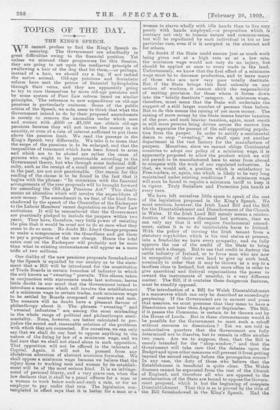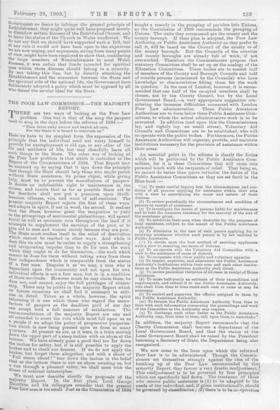TOPICS OF THE DAY.
THE KING'S SPEECH.
WE cannot profess to find the King's Speech re- assuring. The Government are admittedly in great difficulties owing to the financial position. Yet unless we misread their programme for this Session, they are going to act upon the mediaeval principle of swallowing a hair of the dog that bit them,—or perhaps, instead of a hair, we should say a leg, if not indeed the entire animal. Old-age pensions and Socialistic reform have sent the poison of financial hydrophobia through their veins, and they are apparently going to try to cure themselves by more old-age pensions and by some system of Poor Law reform based on similar principles. The reference to new expenditure on old-age pensions is particularly ominous. Some of the public critics of the Speech, we note, seem to think that what the Government intend to do by their proposed amendments is merely to remove the anomalies under which men and women with £800 or £1,000 can obtain old-age pensions because they will not invest the money in an annuity, or oven at a rate of interest sufficient to put them above the pension limit. We read the passage in the King's Speech very differently. We take it to mean that the scope of the pensions is to he enlarged, and that the inequalities of treatment which have been found to arise and which are to be abated are rather the cases of persons who ought to be pensionable according to the Government theory, but who through some technical diffi- culty, such as the receipt of a small amount of poor relief in the past, are not now pensionable. Our reason for this reading of the clause is to be found in the fact that it begins with the phrase: " In connexion with the financial arrangements of the year proposals will be brought forward for amending the Old-Age Pensions Act." This clearly means an alteration which will involve the expenditure of more money. The amendment is, we fear, of the kind fore- shadowed by the speech of the Chancellor of the Exchequer to the Labour Members' recent deputation on the Poor Law exclusions. It will be remembered that the Government are Practically pledged to include the paupers within two years. They have, therefore, very little power of resisting the plea that it would be cruel not to do at once what they mean to do so soon. No doubt Mr. Lloyd George proposes to make a compromise with the Guardians and get them to pay a proportion of the new charge. Hence the total extra cost on the Exchequer will probably not be more than what in existing circumstances will appear as a mere trifle of two millions.
Our dislike of the new pensions proposals foreshadowed by the Speech is equalled by our anxiety as to the state- ment that a Bill will be introduced for the constitution of Trade Boards in certain branches of industry in which the evil known as " sweating " prevails. This clause, taken in conjunction with statements made last autumn, leaves little doubt in our mind that the Government intend to introduce a measure which will involve the establishment of a minimum wage in certain trades, such'minimum wage to be settled by Boards composed of masters and men. The measure will no doubt have a pleasant flavour of philanthropy about it The, phrases " sweating" and "sweated industries" are among the most misleading in the whole range of political and philanthropic senti- mentality. None, however, are better calculated to pre- judice the sound and. reasonable solution of the problems with which they are connected. For ourselves, we can only say that we shall do our best to oppose anything in the nature of the fixing by law of a minimum wage, and we feel sure that we shall not stand alone in such opposition. That opposition will not be offered in the interests of Capital. Again, it will not be pressed from any idolatrous adoration of abstract economic formulae. We shall oppose a minimum wage because we believe that the injury done to working men and women by its establish- ment will be of the most serious kind. It is an infringe- ment of personal liberty, and a very grave one, when the law declares that it shall be a penal offence for a man or a woman to work below such-and-such a rate, or for an employer to pay under that rate. The legislation con- teinplated iu effect says that it is better for a man or a woman to starve wholly with idle hands than to live very poorly with hands employed,--a proposition which is contrary not only to human nature and common-sense, but will be repudiated by each individual in his or her particular case, even if it is accepted in the abstract and for others.
No doubt if the State could ensure just as much work being given out at a high rate as at a low rate, the minimum 'wage would not only do no injury, but should be applied at once to every trade in the land. Unfortunately, we know that the first effect of a minimum wage must be to decrease production, and to leave many of those who are now very poor totally destitute. But if the State brings this final calamity on any section of workers, it cannot shirk the responsibility of making provision for those whom it forces down into the "totally destitute" category. A minimum wage, therefore, must mean that the State will undertake the support of a still larger number of persons than before. But to do this means the raising of yet more money. The raising of more money by the State means heavier taxation of the poor, and such heavier taxation, again, must result in still more persons being driven across the narrow line which separates the poorest of the self-supporting popula- tion from the pauper. In order to satisfy a sentimental desire to stop " sweating," we shall open yet another department in the vast factory for the manufacture of paupers. Meantime, since we cannot oblige Continental countries to adopt our policy of a minimum wage, it is • apparently proposed to allow the product which we will not permit to be manufactured here to enter from abroad to compete with the work of our regulated industries. Is that, we would ask, a position which is satisfactory to Free-traders, or, again, one which is likely to be very long maintained under existing conditions ? A minimum wage will soon be found to require a minimum tariff to keep it in vigour. Truly Socialism and Protection join hands at every turn.
We have left ourselves little space to speak of the rest of the legislation proposed iu the King's Speech. We must mention, however, the Irish Land Bill and the Bill for the Disestablishment and Disendowtnent of the Church in Wales. If the Irish Land Bill merely means a reintro- duction of the measure discussed last autumn, then we can only say that it will require fundamental amend- ment, unless it is to do incalculable harm to Irelaud. With the policy of turning the Irish tenant from a statutory copyholder, which is his real status at present, into a freeholder we have every sympathy, and we fully approve the use of the credit of the State to bring about such a change. But to use that credit to destroy the cattle industry of Ireland, or to force men who are now in occupation of their own land to give up such land, nominally in order that it may be thrown as a sop to a landless class in Ireland, but much more often in order to give anarchical and disloyal organisations the power to reward the instruments of anarchy, is a very different matter. The Bill, if it contains these dangerous features, must be steadily opposed.
The introduction of a Bill for Welsh Disestablishment is a manoeuvre which can only be described as exceedingly perplexing. If the Government are in earnest and press that measure, we must presume that they mean to have a Dissolution not later than August or September. The Bill, if it passes the Commons, is certain to be thrown out by the House of Lords. But in these circumstances would it be possible for the Government to meet such a rebuff without recourse to dissolution ? Yet we are told in authoritative quarters that the Government are fully determined not to dissolve, but to remain in office another two years. Are we to suppose, then, that the Bill is merely intended for the " shop-window," and that the Government will take care that the debates upon the Budget and upon other measures will prevent it from getting beyond the second reading before the prorogation occurs ? In any case, the duty of those who believe that the Establishment is beneficial is quite clear. The Welsh dioceses cannot be separated from the rest of the Church of England, and therefore all who are opposed to the secularisation of the State are bound to oppose the Govern- ment proposal, which is but the beginning of complete Disestablishment. That this is so is proved by the title of the Bill foreshadowed in the King's Speech. Had the, GoVernment no desire to infringe the' general principle of Establishment, they might quite well have proposed merely to clisenclow certain dioceses of the Established Church, and to leave the status of the Church in Wales unaffected. We de not say that we should. have supported such a Bill, but at any rate it would not have been open to the objections we are now urging, and arguments, strong from many points of view, might have been employed to show that, considering the• large numbers of Nonconformists in most Welsh dioceses, it was unfair that funds intended for spiritual uses within those dioceses should belong to a minority. By • not taking this line, but by directly attacking the Establishment and the connexion between the State and the spiritual side of the national life, the Government have deliberately* adopted a policy which must be opposed by all who detest the secular ideal for the State.











































 Previous page
Previous page